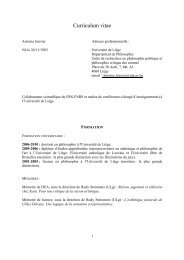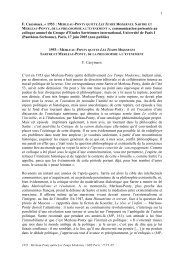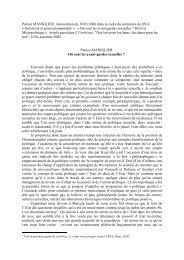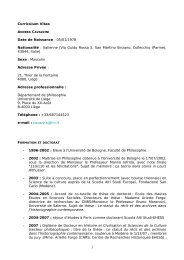Subjectivations politiques et économie des savoirs - Service de ...
Subjectivations politiques et économie des savoirs - Service de ...
Subjectivations politiques et économie des savoirs - Service de ...
Create successful ePaper yourself
Turn your PDF publications into a flip-book with our unique Google optimized e-Paper software.
– Revue <strong>de</strong> philosophie politique <strong>de</strong> l’ULg – N°5 – Mai 2013 – p. 132<br />
Wood also errs when he suggests that Platonic sophrosyne is there to serve the<br />
interest of a small clique and to reinforce the status quo. If one took seriously the<br />
« politics of mo<strong>de</strong>ration » that is put forward in the Laws and the Republic, this would<br />
have un<strong>de</strong>rmined the entire socio-economic structure of Athens (the very structure<br />
Wood is critical of). Perhaps Callicles said it best when he asked Socrates about where<br />
(Platonic) philosophy and (Platonic) justice would lead us:<br />
Tell me, Socrates, are we to take you seriously at this point or are you only<br />
jesting? For if you’re serious and what you say is really true, won’t human life<br />
have to be turned compl<strong>et</strong>ely upsi<strong>de</strong> down? Everything we do, it seems, is the<br />
exact opposite of what we ought to do. (Gorgias 481b)<br />
Realizing mo<strong>de</strong>ration would in<strong>de</strong>ed turn the world upsi<strong>de</strong> down – a claim I will <strong>de</strong>fend in<br />
the second part of this paper.<br />
But before we turn to this, l<strong>et</strong> me suggest another reason for the scholarly neglect of<br />
sophrosyne: mo<strong>de</strong>ration has been regar<strong>de</strong>d, at various points in the history of Western<br />
thought, as a virtue particularly appropriate for women and one entailing (female)<br />
chastity, obedience and silence. Aristotle thought he captured feminine virtue well when<br />
he quoted Sophocles’ quip « To a woman silence is a crowning glory » (Politics,<br />
1260a29-30) and so did St. Paul when he suggested that women « should adorn<br />
themselves in mo<strong><strong>de</strong>s</strong>t apparel, with shamefastness and sobri<strong>et</strong>y… L<strong>et</strong> the woman<br />
learn in silence with all subjection […] I suffer not a woman to teach, nor to usurp<br />
authority over the man, but to be in silence » (I Timothy 3:16). Centuries later, Jean-<br />
Jacques Rousseau was building on a very long tradition when he told his rea<strong>de</strong>rs that<br />
mo<strong><strong>de</strong>s</strong>ty and shame would constrain Sophie’s passions – whereas Emile’s own<br />
mo<strong>de</strong>ration would be the result of a proper usage of his reason. 38 As far as ancient<br />
thought is concerned, Helen North and Adriaan Ra<strong>de</strong>maker have both shown the <strong>de</strong>gree<br />
to which in antiquity, sophrosyne for women characteristically meant mo<strong><strong>de</strong>s</strong>ty,<br />
qui<strong>et</strong>ness and obedience. 39 Alasdair MacIntyre is thus certainly not the only scholar to<br />
have observed that « sōphrosun ē is for the Greeks the womanly virtue 40 ». As such,<br />
many scholars today might be r<strong>et</strong>icent to take mo<strong>de</strong>ration seriously because it is<br />
(rightly) associated with the repression of female sexuality and female speech.<br />
But what is extremely significant for us here is that for Plato, mo<strong>de</strong>ration is not a<br />
womanly virtue. Having reviewed all works produced from Homer to the Church Fathers,<br />
38<br />
39<br />
40<br />
Rousseau, Émile, Paris, Garnier-Flammarion, 1966, p. 467.<br />
H. North, Sophrosyne: Self-Knowledge and Self-Restraint in Greek Literature, op. cit.; A. Ra<strong>de</strong>maker,<br />
Sophrosyne and the Rh<strong>et</strong>oric of Self-Restraint: Polysemy and Persuasive Use of an Ancient Greek Value<br />
Term, Lei<strong>de</strong>n, Brill, 2005, p.<br />
A. MacIntyre, After Virtue, Notre Dame, Notre Dame Press, 1984, p. 136.
















